By LAUREN M. E. GOODLAD

Toward the end of the first season of Borgen (2010-13), Bent Sejrø, the aging mentor to Birgitte Nyborg, who is Denmark’s prime minister, advises her to “divide and rule.” He has in mind the ancient Roman practice of diffusing authority so as to strengthen one’s government over the whole. Earlier in the season, Bent is the ally who spurs Birgitte to brave the Machiavellian gauntlet necessary to becoming the first woman to occupy “Borgen” (“the Castle”) as the nation’s prime minister. “Power is not a cute little lapdog that jumps up and lies in your lap,” Bent tells her. To make Denmark hers she must “grab” power “and hold on to it.” Over the course of the season, Nyborg proves that she is every inch a Statsminister. From her first tentative steps, we watch as she sharpens the political skills necessary to leading colleagues and adversaries alike, while crafting a leadership style coded as both feminine and decisive.
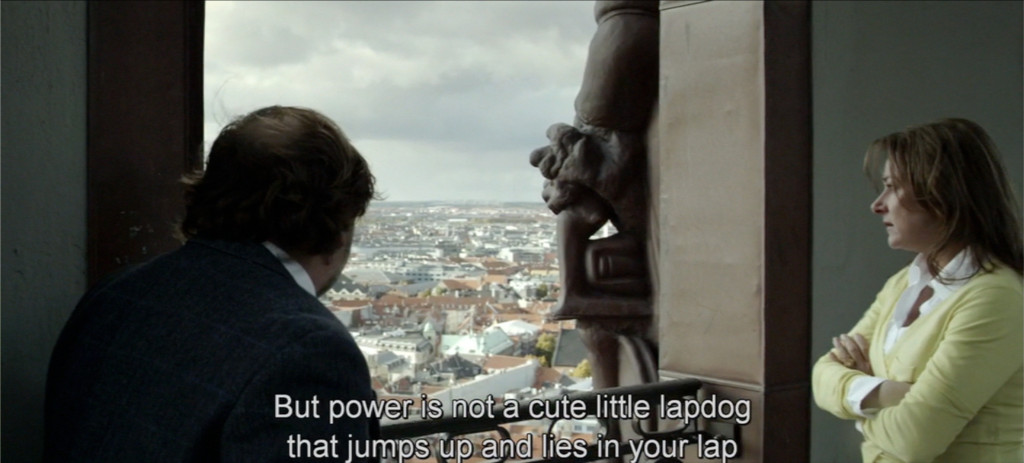
Yet, “Divide and Rule” is also ironic in providing the title for an episode about personal challenges that no male mentor can help Birgitte to negotiate. To rule Denmark, apparently, is to divide herself from the loving family and supportive marriage that have been central to her identity. In this way Borgen, like Forbrydelsen (2007-12)—the dark police procedural (also known as The Killing) which put Danish television on the world’s “must watch” list—suggests that women’s power and authority always come at a cost.
No doubt the readers of this piece are familiar with such American strongmen as Tony Soprano, Don Draper, Walter White, and, more recently, the alpha male duo at the center of True Detective’s first season. Compared to this love affair with Übermenschen, the Danish Broadcasting Corporation’s focus on resourceful women like Sarah Lund—Forbrydelsen’s dour and solitary detective—provides a refreshingly different gendered perspective. Nor should we conflate two serial narratives that draw on distinct genre conventions. Although Forbrydelsen has its own take on Danish politics, it is first and foremost a police procedural, the grisly naturalism of which recalls a long line of hard-boiled female detective series beginning with the UK’s Prime Suspect in 1991. By contrast, Borgen is a political Bildungsroman, a genre harking back to the social realism of novelists like Balzac and George Eliot. Both Danish shows draw the dense webs of power which circumscribe individual lives at the turn of the millennium. But with its closer ties to nineteenth-century genres, Borgen is more invested in the effects of multiplottedness: the way that particular events or themes can cut across the zones of a storyworld to ramify ethical, political, and aesthetic perception.
 Like Eliot’s Middlemarch (1871-2)—another serial narrative that places an idealistic woman at the fore of a complex social location—Borgen proposes that despite the clear limitations of individual moral acts, the morality of individuals remains the best hope for collective progress. But Borgen is also profoundly contemporary. The show addresses a nation of citizens who are increasingly asked to experience themselves as consumerist strivers or, still worse, victims of a society infiltrated by immigrants and the politically correct elites who enable them. This crisis of Danish mettle plays out against a backstory of world financial crisis, deepening neoliberalization, and American hegemony.
Like Eliot’s Middlemarch (1871-2)—another serial narrative that places an idealistic woman at the fore of a complex social location—Borgen proposes that despite the clear limitations of individual moral acts, the morality of individuals remains the best hope for collective progress. But Borgen is also profoundly contemporary. The show addresses a nation of citizens who are increasingly asked to experience themselves as consumerist strivers or, still worse, victims of a society infiltrated by immigrants and the politically correct elites who enable them. This crisis of Danish mettle plays out against a backstory of world financial crisis, deepening neoliberalization, and American hegemony.
Though Borgen is riveting in depicting the kind of realpolitik particular to parliamentary coalitions, it is a quite different genre of political narrative than Netflix’s House of Cards (2013-)—a show more interested in probing the pleasures of venality than the art of the possible. To be sure, Borgen has its share of cynics: most especially, Michael Laugesen, the champagne-sipping Labour leader who gleefully pees on Parliament before reinventing himself as a tabloid provocateur. Contemptuous of such naïve notions as government by the people, Laugesen declares that a “tiny privileged circle of people rule Denmark,” a system that suits him just fine so long as he is one of them. But while Laugesen’s antics play out across all three seasons, Borgen is more interested in the lives of lesser sinners like Kasper Juul, the shrewd “spin doktor” whose lack of center bespeaks a traumatic childhood, and Torben Friis, the television news producer wedged between journalistic ideals and pleasing his bosses. That these male figures command so much sympathy despite their flaws highlights the show’s pointed reliance on women for its vision of a better Denmark. Whereas Birgitte Nyborg hopes to revitalize the nation’s political sphere, Katrine Fønsmark, an ambitious young newscaster, defends the integrity of the fourth estate with the help of Hanne Holm, her battle-worn mentor.

Decency in the Middle
Crucial to this regenerative purpose is Borgen’s conviction of “Decency in the Middle”—the title of the show’s first episode. When we first meet Nyborg, she is the leader of De Moderate, one of several minority parties that have splintered from the establishment politics of Labour (based on Denmark’s real-life Social Democrats) and the Liberals (a center-right party based on the real-life Venstre). When Liberal PM Lars Hesselboe embroils himself in a scandal involving purchases for his wife on a government credit card, the unscrupulous Laugesen overplays his hand while Nyborg’s heartfelt appeal to the people results in a huge win for her party. The way is paved for the Moderates to invite Labour and the Greens to join a coalition led by Nyborg.
Over the course of the first two seasons, Nyborg learns to negotiate crises, mediate disagreements, and execute her role as a sure-footed, forward-thinking head of state. While she believes that “democracy is a dialogue,” she learns that governing a democracy is also about the need to decide and act. The ministers in her own coalition require constant vigilance since these ambitious politicians cannot but crave power and influence for themselves and their parties. The hectoring of Bent, her old friend and fellow Moderate, is another mixed blessing. When necessary, Birgitte seeks counsel from experts outside government including her husband Phillip Christensen, a former CEO and lecturer in international finance. Above all, she relies on media adviser Kasper Juul. Though his “spin” rests on the shakiest of civic principles and is shot through with personal tragedy, he is, paradoxically, the only character she can trust to keep her political interests in mind.
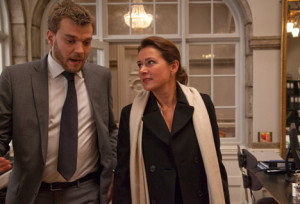
Of course, as the leader of De Moderate, Nyborg’s opposition to the neoliberal status quo is not a staunch Leftism like that of Spain’s Podemos or Greece’s Syriza. It is, rather, a centrist vision of “broad compromise” which entails crossing party lines to create lasting change. As a political progressive, Birgitte supports the Green Party’s Left agenda: but as Prime Minister, she believes that scaled-down reforms won partly through tolerable concessions to the Right are the best way forward. Old-school Left politics like that of her father or Bent are consigned to the past with little nostalgia. In “The Last Worker,” a Season 2 episode, Birgitte looks on as Labour ousts a leader who perceives himself as the last in his party to rise to the top from the rank-and-file. And while Birgitte keeps her distance from American influence, she finds her own reasons to increase military spending and stay the course in Afghanistan. Only xenophobic anti-immigrant policies, which offend her vision of a tolerant Denmark, evince a more assertive Leftism from this consummate pragmatist.
Then too, “Decency in the Middle” is not only Nyborg’s political creed. It is also the formal structure of many Borgen episodes. Committed to preserving Denmark’s welfare state during a time of austerity, Nyborg expands education through reduction of early retirement. When she is advised to turn a blind eye to American use of Greenland to transfer illegal detainees, she visits Denmark’s former colony and grants more autonomy to its indigenous government. Faced with a powerful businessman’s call for intervention in an African civil war, she determines to broker peace. Such persistent emphasis on finding the center and bridging Right and Left may remind American viewers of Barack Obama’s bid for a “grand bargain” with Republicans (though the tactic works differently in a system like Denmark’s in which the governing coalition, by definition, has the votes to decide).

It is all the more ironic, therefore, that, while female statesmanship calls forth arts of compromise which Birgitte eagerly masters, marriage and motherhood turn out to be absolute and unyielding. What begins as the most idyllic of domestic partnerships gradually founders until it crashes with almost inexorable force. This is, to be sure, partly to do with unfortunate timing. Having agreed to spend five years each supporting one another’s careers, Phillip is at the end of his allotted stint as primary caregiver when Birgitte gets the chance to become Prime Minister. When she asks if he is willing to undertake this sacrifice, he replies that no man wants to keep his wife from taking such an opportunity. Of course, as anyone watching Borgen knows, most of the men it depicts would never marry a politician in the first place—men like Lars Hesselboe whose neglected wife triggers the scandal that elevates Birgitte to power. Still, if we trust in Phillip’s readiness to endure a few more years in academia, it is doubtless because we feel his pride in his wife’s achievements, perceive his self-confidence, and, above all, believe that these loving partners will find a way to locate their own “decency in the middle.”
That this turns out to be very far from the case may seem, on reflection, like a poorly executed contrivance. Why, we might ask, does this wealthy couple lack domestic help? (Yes, they want their children to have a parent helping with homework and eating dinner at home. But does that really mean that the Prime Minister’s husband must cook every meal and wash every pot and pan?) Others may point to Birgitte’s signal failings: consumed with affairs of state, she is too distracted to give her family the attention they need. On at least one occasion she forgets that however much power she wields in Borgen, in her own castle she is part of a couple that has thrived on equality. “I love my wife,” Phillip tells her in one episode, adding that he is less sure about “that Prime Minister lady.”
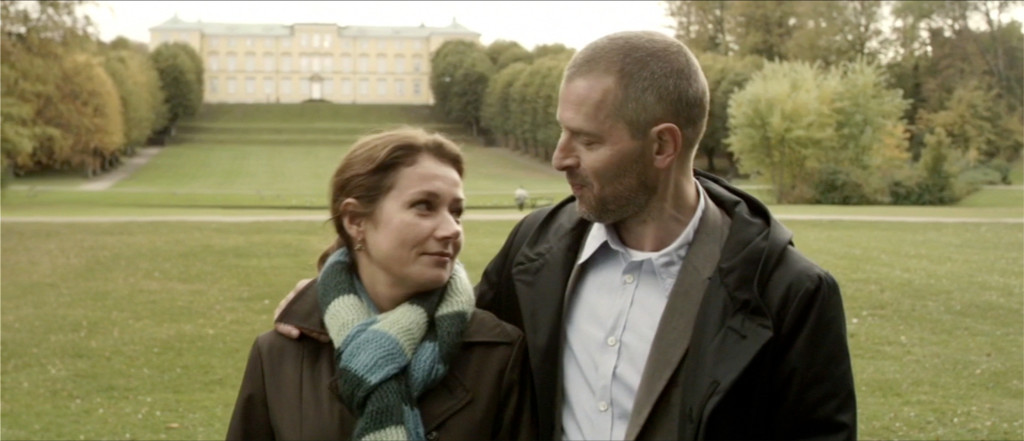
It is also possible, as my colleague Ted Underwood wrote on Facebook, that Phillip is “a chilly monolith of passive-aggressive blame targeted at the doubts of working women.” Ted’s observation may have something to do with the fact that Phillip eventually loses his interest in sex when he begins to feel like an accessory to his wife’s official life. The man who starts the season by joking that he looks forward to “blowjobs” from the Prime Minister ends up rejecting precisely that offer. It is only later, when he tells Birgitte that he has agreed to become the CEO of a major corporation, that he rediscovers his passion for her. Explaining why he has taken on the kind of position he had agreed to forego he tells her, “I wanted it”—speaking a Danish word that sounds like “lust.” We get the idea.

The problem is that, as Birgitte heeds Bent’s advice to delegate more authority to her cabinet, Katrine’s reporting reveals that Defense Minister Hans Thorsen has been accepting gifts from the manufacturer of planes that Denmark is purchasing for its military. Given the intense scrutiny that follows, Phillip’s position as the new CEO for a company that supplies parts for the planes becomes a liability, leading Birgitte to ask him to resign. Furious, he disappears. “I felt like breaking something,” he tells her when he finally comes home, admitting that he has had an affair.
When Birgitte confides in Bent, he reminds her that most politicians’ marriages are a disaster: his advice is to seek the kind of “arrangement” he has with his wife. Eager to save the marriage, Birgitte urges Phillip to weather the storm until they can repair the relationship—during which time she will accept his need for “intimacy.” When Kasper advises a televised interview to quell rumors about the PM’s marriage, Phillip, unwilling to play his part in a sham, asks for a divorce. Birgitte goes on to open Parliament with the best speech Denmark has heard for decades, assuring Danes that “they are better than they think they are” and inspired by a famous inaugural address: “Ask not what your country can do for you—ask what you can do for your country.”As a newscaster remarks, Nyborg’s first year in power has proved her to be a “resolute and realistic PM.”
What You Can Do For Your Country
I want to suggest that none of these explanations for Borgen’s broken marriage plot—contrived writing, bossy Birgitte, passive-aggressive Phillip—is entirely satisfying. Borgen is nothing if not a well-crafted realist fiction which means that if, in one sense, everything in it is contrived, in another, nothing feels that way. This includes the slow-motion destruction of a marriage that is narrated to coincide with Birgitte’s success as head of state—one of the best prime ministers in Danish history, according to Kasper. There is, in other words, a carefully scripted plausibility to the disturbing notion that the same woman who achieves “broad compromise” in the public realm cannot figure out how to accommodate her family’s needs once she becomes Prime Minister. This does not mean that Ann-Marie Slaughter is right to allege that feminism encourages married women to believe they can “have it all.” It means, rather, that there is a deeply structured tragic irony—a necessary fatality—in Borgen’s narrative which plays itself out through marital rupture. We see this first when Birgitte, learning of the affair, repels Phillip’s outstretched arms, falls, and ends up cutting her eye.

The Prime Minister’s appearance on television must thus be filmed so as to conceal the evidence of her battering. Whereas Denmark sees their stalwart Statsminister shot from the right, viewers of Borgen see her head on and know what she suffers.
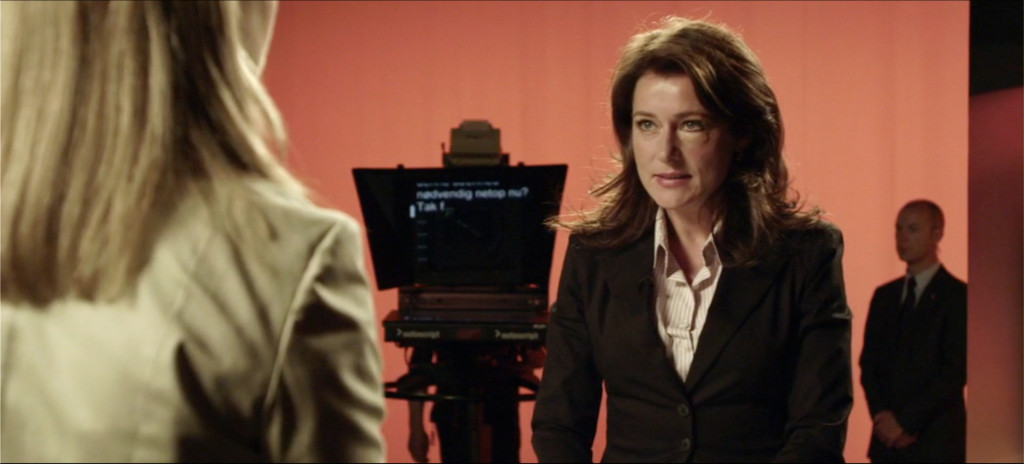
The same fatal irony determines Birgitte’s somehow forgetting that her husband wants a job, not a mistress. Thus, her attempt at compromise—hatched from vague notions about what male politicians have done in her shoes—merely confirms Phillip’s sense that his wife has become someone else. Yet, when Season 2 opens several months later with the children living in Birgitte’s custody, Phillip somehow fails to realize that she has made the kind of changes which would have precluded the rift in the first place. Instead he presses her to finalize their divorce. The episode opens with Birgitte wearing body armor as she visits troops in Afghanistan and closes with her breaking down in Phillip’s arms. Shot from above she tells him, “I don’t want to divorce you”

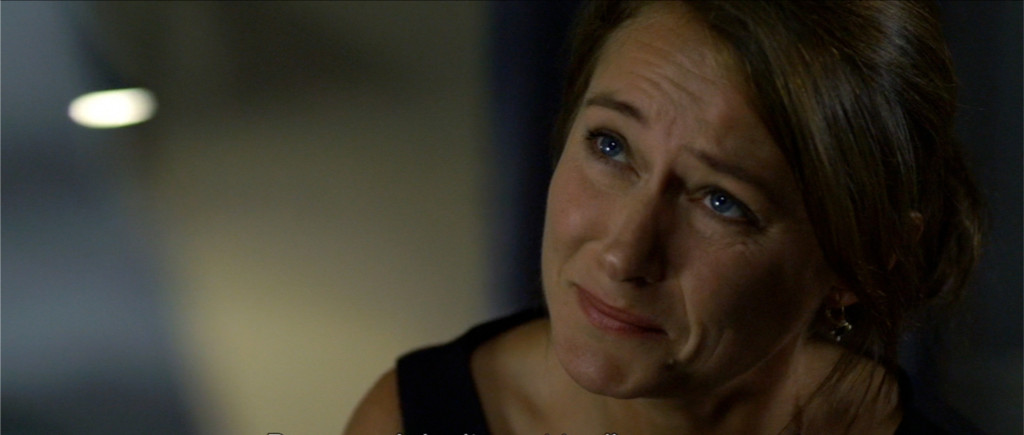
Such pointed contrasts recur throughout the second season. As Nyborg grows into an ever more confident leader, Phillip’s new relationship with a pediatrician takes a private toll. Accidentally overhearing the couple’s giddy banter on the cell phone, she must cancel a plan to meet Phillip’s new “kæreste.” When her daughter Laura calls to assure her that Cecilie is really nice—she cooks Mexican food and plays Pictionary—Birgitte is once again reduced to tears. If Borgen thus makes a spectacle of her suffering, the reason is not (or not intentionally) to humiliate this formidable character but to dramatize the tension between the success of political Bildung and the pathos of broken marriage.
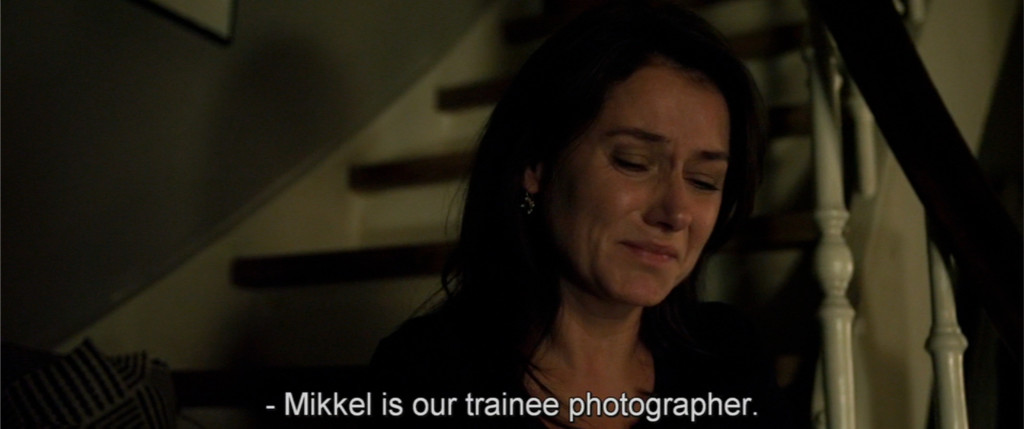
Borgen’s multiplot structure amplifies these effects since, for all her exceptionality, Birgitte is the emblem of the many professional women whose sacrifices point the way to a better Denmark. There is Hanne Holm, the pioneering journalist who built a career as a foreign correspondent while her ex-husband raised the daughter that no longer talks to her. Holm’s irrepressible candor and inspiring alliance with Katrine are shadowed by episodes of alcoholic ruin.

Though Katrine herself is too young and talented to show any such wear, by Season 3 she is raising a child whose father is the incorrigible Kasper. When the little tot cries for his Grandma as his mother cares for him, we laugh—but we also worry. We do not want Katrine to end up drinking or want her child to grow up feeling abandoned (like Sarah Lund’s son in Forbyrdelsen).
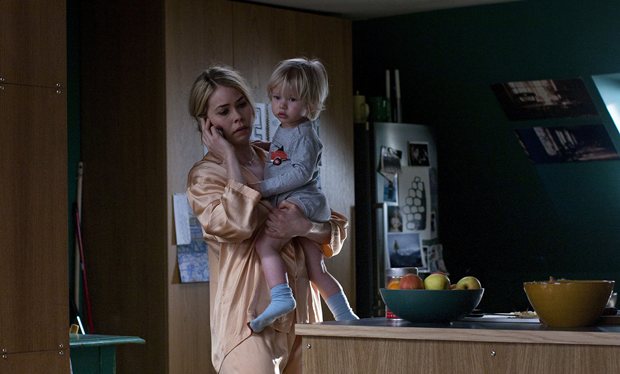
In fact, Borgen knows that we feel this way. Toward the end of Season 2, Laura suffers from anxiety attacks and must be hospitalized. As Birgitte and Phillip pull together to support their daughter, each recognizes his or her part in triggering the crisis. A friendly doctor assures Birgitte that Laura did not become ill because her mother became Prime Minister. Yet, she also articulates the professional woman’s paradox in a nutshell: “You can’t work 24 hours a day and be a good mother – but you can’t stop working.” (When Birgitte confesses that she finds running Denmark easier than family life, a priceless moment follows in which the shrink, dragging on a cigarette, says, “Welcome to the club.”)
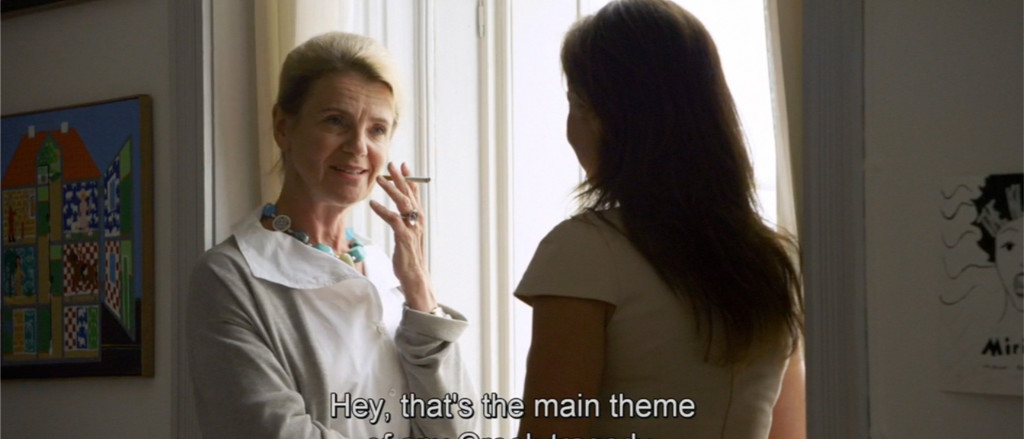
Soon, however, paparazzi stake out the hospital and Laura is asked to leave. Birgitte responds by finding a way around the contradiction that demands that motherhood be all or nothing: she will put Denmark on hold, taking a leave of absence to care for her ailing child.
A month later, Phillip watches as Birgitte’s political rivals criticize her for dereliction of duty. In the richest of ironies, Hesselboe—who lost an election because of his wife’s distress—complains that Danes need the best prime minister, not the best spouse, parent, or human being. Earlier in the episode, Birgitte reproaches Phillip for the first time: “It takes time to find the right balance. We had to invent it.” “You were weak, and you quit. You let me down.” Listening to Hesselboe boast about neglecting his wife when the country needed him, Phillip realizes that she is right. The season closes with him ending the relationship with Cecilie while Birgitte calls an election.

When Season 3 opens three years later, Birgitte has temporarily left politics. Though she and Phillip are friendly, they never reunite as a couple: he is unattached, but involved in the affairs of his family, and she has begun a relationship with a British architect. Apparently, having squared the circle of being a great prime minister and great mother as well, Birgitte can “have it all” and then some. (Unless, of course, she dies of breast cancer.)
Perhaps the most striking feature of Borgen’s last season, however, is the multiplot turn to Torben Friis. Harried by a cocky young supervisor obsessed with ratings and gimmicks, Torben discovers that he is no longer “sexy” enough to get a new job. The compensatory office romance that follows shows us yet another disappointed professional woman. But the focus on Torben’s enervated masculinity also tells us more about why Borgen envisions women as the primary bearers of change.
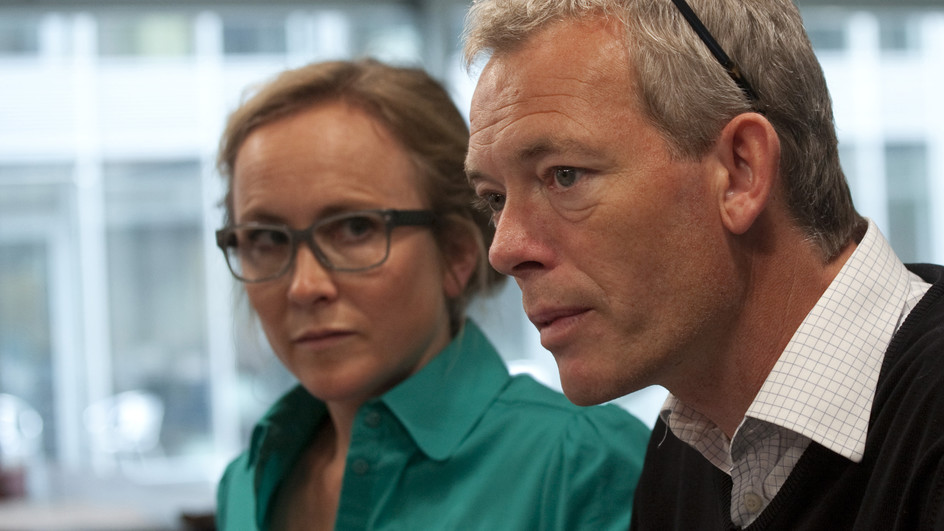
I want to suggest, nonetheless, that Borgen is something of a conundrum. The show creates female characters who are never overshadowed by the men in their lives. It evokes the persistent sexism of one of the world’s most gender-equal, “happy,” and sexually open-minded countries. Over and again we witness the pats on the bottom, the patronizing remarks, the scorn heaped on feminism, age, “goody two shoes,” and so on. But the writers of this show—who, like the writers of Forbrydelsen, all happen to be men—have, perhaps unwittingly, created a trap. In their imaginary pantheon, Danish women take on moral and political struggles of which, men, apparently, are no longer capable. (This does not mean that Danish men “have it all” but only that damage or self-interest keeps them at the margins of the nation’s moral life.) Thus, though the intention is clearly otherwise, Borgen installs a new kind of double standard: it conjures women’s exemplary civic passion and then demands full access to the resulting pathos.
One is prompted to wonder how Sarah Lund would look if she paused to weep over every lost love before entering dark buildings armed with a flashlight. (In fact, there are moments throughout Forbrydelsen which gesture toward this very perception—but the conventions of hard-boiled guarantee that Sarah’s suffering will be rigorously curtailed.) To think about what the relaxation of this double standard would look like, we might imagine a show in which scenes of Hesselboe’s private despair follow each glib remark and slippery maneuver—as though he were the Lydgate to Birgitte’s Dorothea.
Of course, the stories of Kasper and Torben occupy precisely this space of male interiority in the journalistic sphere (just as Troels Höxenhaven’s tale of closeted homosexuality goes some way toward showing that male politicians may also pay a price). In this way, multiplot genres tell us more about modern lifeworlds than any single character’s narrative can compass. Nonetheless, it is telling that one of Borgen’s finest moments—when Birgitte tells Phillip that he was weak to let her down—comes too late to challenge the inverse relation of political Bildung and broken marriage.

In fact, the real-life female Prime Minister of Denmark who rose to power less than a year after Borgen first aired, (as a Social Democrat, not a moderate), is still married to her British husband (who, as Neil Kinnock’s son, doubtless knows a thing or two about the “Last Worker” zeitgeist).
Maybe this couple has “an arrangement” and relies on spin doktors for damage control (as the Clintons have done for some time). Of course, I don’t know and, to be honest, don’t care. But would it not be wonderful to see a show like Borgen counter the Slaughter mentality by imagining what “the right balance” might look like or entail? If the answer is that Season 3 did precisely that when it gave the politically resurgent Birgitte a patient kæreste and a loving ex in the wings (alongside a cancer diagnosis), I’d like to suggest that there may be more to it than Slaughter’s misguided notion that middle-class professional women who manage to please their bosses, lovers, and children “have it all.”
When Birgitte fires Bent at the end of Season 1 despite years of friendship, he tells her she is “good at separating things.”
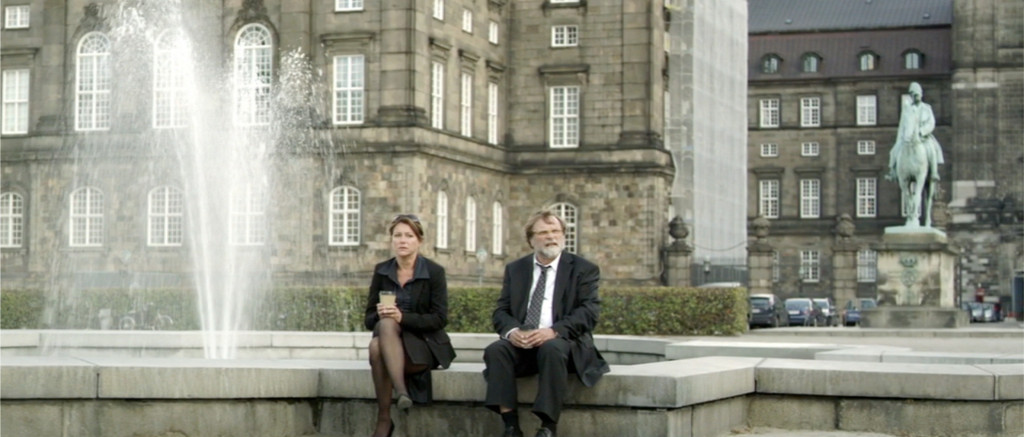
Though the world of high-stakes politics has, to be sure, its unique version of dog-eat-dog, in fact, neoliberal work discipline insists on such compartmentalization. Pressed on relentlessly by professional demands, we learn late in the game what is left for our friends, loved ones, and fellow citizens. This is the tragic irony of all neoliberal lives. As it reckons with this reality, Borgen proposes a “Common Future” in shared civic life. But when the show occludes the private worlds of cynical male leaders like Laugeson, Hesselboe, and Thorsen, it falls into a kind of cliché. By shielding such men from the camera’s gaze, it endows them with a political edge that may compensate for the moral high ground they’re denied.
In fact, inventing “the right balance” is not simply a question of how much time married professionals spend at home. Likewise, shared civic life requires more than political trade-offs between Right and Left (though that may make sense as a starting point).This is why the tension Borgen seeks between Bildung and tragedy is everywhere latent in the neoliberal storyworld: including the workers who have lost their access to high-paying jobs and political power and the immigrants who have not yet found a voice in that tiny circle that rules Denmark.
Perhaps in sensing that tragic irony is a cathartic emotional valve for viewers in search of alternatives, Denmark’s writers are even “better than they think they are.”
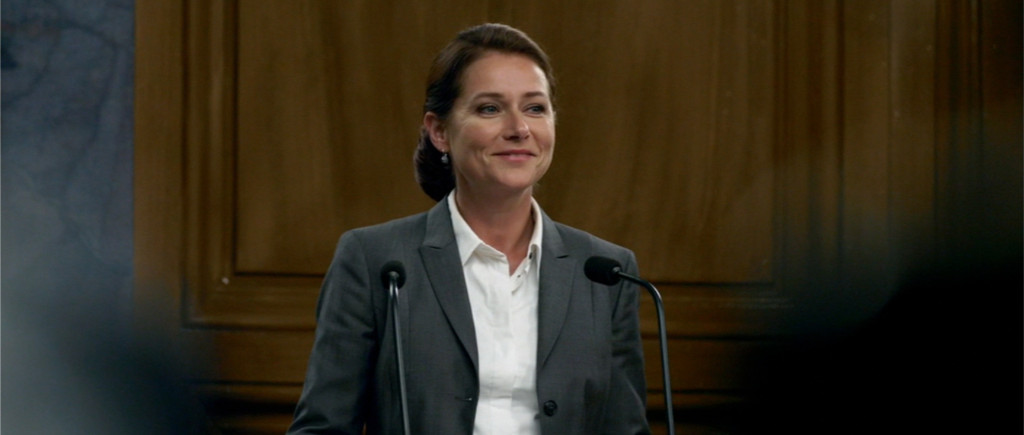
Like Birgitte’s unforgettable power panache, from her irresistable smile to her designer accessories, a Borgen from below might provide another potent lens on what Danish television can do for its country.
***
Lauren M. E. Goodlad is the Kathryn Paul Professorial Scholar of English and Criticism & Theory at the University of Illinois, Urbana where she is also Provost Fellow for Undergraduate Education. Her publications include The Victorian Geopolitical Aesthetic: Realism, Sovereignty and Transnational Experience (2015), the co-edited ”Mad Men,” Mad World: Sex, Politics, Style and the 1960s, as well as the Afterword to Television for Victorianists, a special issue of RaVoN. For advice on earlier drafts of this essay, Goodlad wishes to thank Mark Sammons, Cindy Eisenberg, Tim Dean, Ramon Soto-Crespo, Ayelet Ben-Yishai, Ted Underwood, and Kristin Romberg.




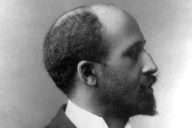

No Comments